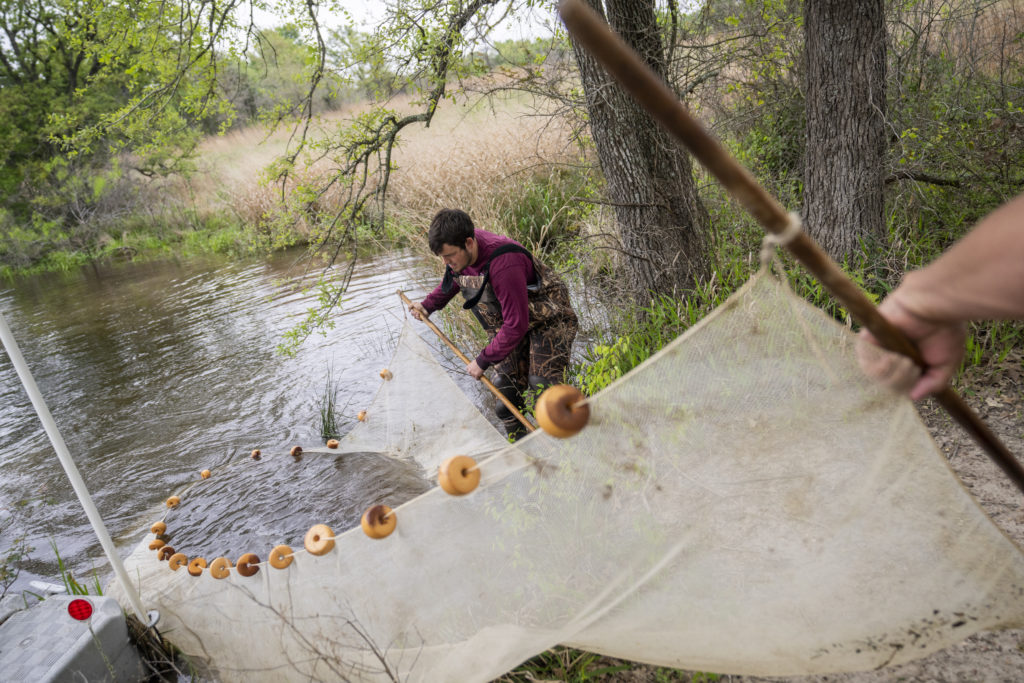
B.S. Rangeland, Wildlife and Fisheries Management
The Bachelor of Science in Rangeland, Wildlife and Fisheries Management degree equips students with the vital skills, knowledge and ethical standards needed to establish a successful career in the diverse field of natural resource management. Our curriculum was deliberately designed to exceed federal qualification standards as well as the professional certifications administered by professional organizations such as The Wildlife Society, Society for Range Management and American Fisheries Society. Our program also provides a solid foundation for students who plan to pursue a graduate education or other professional programs. Graduates of RWFM are qualified for careers with leading state and federal conservation and science-based agencies, as well as private land enterprises and non-governmental organizations. Because of the complex and diverse nature of the field, the B.S. in Rangeland, Wildlife and Fisheries Management program offers four unique, specialized tracks to further tailor a student’s degree to best suit their interests and post-graduation goals. Students in this major can choose an area of focus in either:
- Rangeland Management
- Wildlife Management
- Aquaculture and Fisheries Management
- Natural Resources Management and Policy
Program Details
To view individual degree plans, students are encouraged to view the undergraduate handbook and the degree plans on the pages for each option.
- Degree: B.S. Rangeland, Wildlife and Fisheries Management
- Credit Hours: 120 total credit hours
Choose a Track Option
Rangeland Management
The Rangeland Management track combines the disciplines of ecology and range management to best promote the production, conservation, function, and stewardship of rangelands found around the world. Our curriculum focuses on fundamental ecological and rangeland principles used in addressing leading challenges, such as watershed health, invasive exotic plant control and wildland fires. Included in this track is a summer field camp providing intense field experience to solidify principles students will need to pursue advanced coursework in focal management areas.
Wildlife Management
The Wildlife Management track builds a strong foundation in managing wildlife populations and their habitats, with courses targeting key topics such as wildlife population dynamics, anatomy and physiology, habitat management principles and wildlife techniques. Included in this track are summer field practicum and internship requirements, providing intense field experience opportunities to solidify principles students will need to understand to pursue advanced coursework in focal management areas.
Aquaculture and Fisheries Management
The Aquaculture and Fisheries Management track blends chemistry, mathematics and biology basics with the advanced techniques necessary to sustainably manage wild fish populations or inland fishery/aquaculture operations. Courses are designed to focus on the integration of applied fisheries management and aquaculture production disciplines, preparing students to handle traditional and emerging, complex issues. Core areas of study include fish biology and disease, hatchery management, commercial aquaculture production, restoration and stock enhancement aquaculture, aquatic ecosystem management and water quality management.
Learn more about the Aquaculture and Fisheries Management track
Natural Resources Management and Policy
The Natural Resources Management and Policy track prepares students to examine environmental and conservation issues through a multi-disciplinary framework that includes political, cultural, social, economic, regulatory and ecological dimensions. Courses emphasize development of skill sets that promote strong interpersonal skills, leadership, and collaboration with varied stakeholder groups. These critical skills are taught in the classroom and through field experiences, working in tandem to enhance students’ ability to assess complex environmental issues, envision a desired conservation outcome, and design and implement a plan needed to bring visions to fruition.
Learn more about the Natural Resources Management and Policy track
Admissions
We’re committed to providing students opportunities to get a well-rounded education that prepares them to become leaders in their professions and in a variety of job sectors. That means a focus on leadership training, promotion of critical thinking skills and experiential learning opportunities rooted in evidence-based science and practical application.

On the hunt for sustainability
A unique course opportunity for students within the Texas A&M College of Agriculture and Life Sciences explores wildlife conservation through the lens of a multifaceted practice that has sustained humans for millennia and is foundational to the North American Model of Wildlife Conservation—hunting.